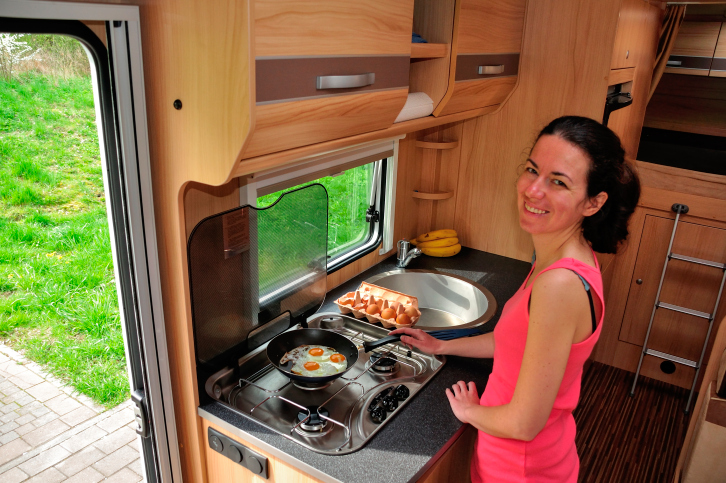
Cooking Safely in Your RV
 If you’re looking to stick to your budget and avoid unhealthy restaurant foods, cooking in your RV or at your campsite is essential. Not only can you choose what to eat when you want, but you can cook it to your liking. But cooking in small, crowded spaces can be dangerous if you don’t take proper precautions. To avoid the need to file an RV insurance claim on account of fire damage, follow these tips.
If you’re looking to stick to your budget and avoid unhealthy restaurant foods, cooking in your RV or at your campsite is essential. Not only can you choose what to eat when you want, but you can cook it to your liking. But cooking in small, crowded spaces can be dangerous if you don’t take proper precautions. To avoid the need to file an RV insurance claim on account of fire damage, follow these tips.
- Keep Cooking Areas Clutter-Free: Don’t leave items near your range while you cook. The bread bag that you’re using to make grilled cheese sandwiches could easily melt and burn you if it accidentally gets near the flames. The same goes for outdoor cooking; set up your grill away from trees or grassy areas that could easily catch fire from stray sparks.
- Use Your Crock Pot Wisely: Veteran RV travelers love the convenience of crock pots, but be sure that it’s working properly, the cord is not broken or near a source of heat and that you turn it off when you’re done. If you’re going to be out of the RV all day, use the timer feature on your crock pot so that it turns off automatically when it’s done.
- Keep Foods At The Proper Temperatures: The FDA says that cold foods should be stored at temperatures below 40 degrees and hot foods above 140 degrees. If you use a cooler to supplement your on-board refrigerator, always add new ice when you stop to refuel. Cook meat to the proper temperatures to avoid food poisoning, and always use refrigerated items before their expiration date.
- Make Use Of Dried And Canned Foods: If you’ll be traveling in an area where fresh food sources will be few and far between, rely on dried meats and soups, with the occasional find of fresh veggies to supplement your meals. Canned staples like beans, tomatoes and corn can be transformed into a variety of dishes when you use different spices to alter their flavors. Canned and dried fruits can satisfy any sweet tooth and can also be transformed into cobblers and ice cream toppings.
- Inspect Electrical Appliances Before Each Outing: For people who aren’t living full-time in their RV, look over your appliances before you take off on each trip. If in doubt, take it to be repaired or replace it.
One more thing to do before hitting the road is reviewing your RV insurance policy with your agent. Make sure you have enough coverage to ensure you’re protected during your travels.http://www.cloverleafins.com/rv/recreational_vehicle_insurance_quote.aspx
Safety comes first before traveling cross-country. Call Cloverleaf Insurance at (800) 530-5822 for more information on RV insurance.
Categories: Blog
Tags: living full-time in their RV, RV insurance claim, RV insurance policy
